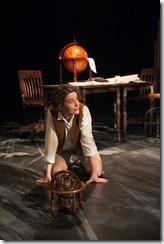
The Life of Galileo
Scattered narrative struggles to find its center
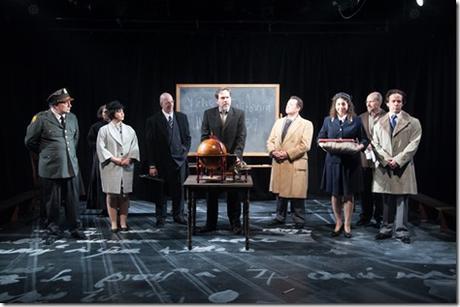
Bertolt Brecht wrote The Life of Galileo over a 15-year period and was still working on it when he died. The play's scope spans nearly a 30-year period. So it's hardly surprising that a modern production of this piece comes across as scattered. Its themes of suppression of knowledge by those in power and choosing between truth and comfort remain relevant today, however.
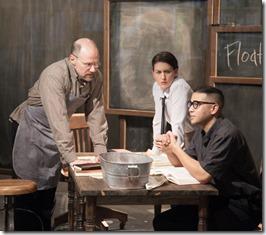
The plot boils down quite simply and with much historical accuracy. Galileo (Shawn Douglass) improves upon the design of a telescope so that it can magnify objects 20 times in size. He observes celestial bodies with this telescope, finding strong proof of Copernicus' heliocentric theory. The idea that the Earth is not the center of the universe threatens the teachings of the church, who in turn threaten Galileo into recanting his scientific discoveries.
Brecht takes some license in personifying Galileo's relationship with his daughter, Virginia (Susaan Jamshidi). Galileo alternately acts protectively of her then dismisses her in favor of his favored pupil Andrea (Kelsey Brennan). It's this fictionalized relationship that elevates a textbook historical account into a story worthy of theatrical presentation, yet Nick Sandys' staging pushes this crucial dynamic aside in favor of deliberate minutiae concerning scientific theory and political maneuverings. Virginia changes over the decades, but her steadfast devotion to her father never wavers. The moments in which Galileo betrays that devotion aren't allowed to land, with rushed dialogue and fadeouts obscuring what could work as powerful moments.
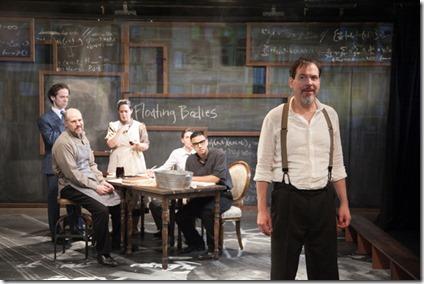
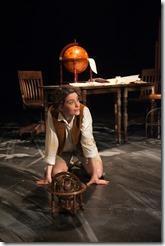
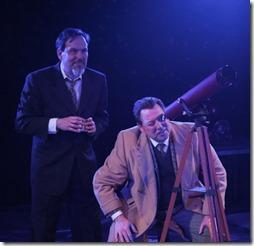
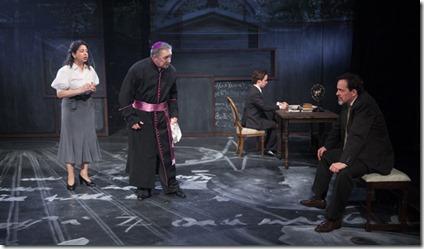
This is a lengthy play by modern standards, so I understand the instinct to move things along. But a better approach would have been to cut some of the repetitive dialogue, tighten down the dozens of characters portrayed, and provide more modulation in the cast's performances. Douglass particularly struggles with this modulation. His Galileo delivers a repetitive note of authoritarian angst and little else. Not only does this become grating, but it contradicts the text; Galileo's love of worldly pleasures and comforts is threaded throughout Brecht's work and crucial in the character's ultimate decision to recant. Yet we never see Galileo actually enjoying himself, just harrumphing about the stage and discussing work matters.
The rest of the actors behave in a heightened theatrical manner, which stays true to Brechtian theatre. In using this method, the cast has an opportunity to create compelling, memorable characters. The only actor who fully succeeds in doing this is Blake Montgomery, who plays both a Vatican high-up and university chancellor in an endearingly pompous manner. Since the rest of the cast doesn't unify under pushing this elevated style, his strong performance appears out of place.
One of Remy Bumppo's most commendable traits is its willingness to tackle challenging productions. While I commend their initiative here, they ironically lose sight of the central conflict of Galileo's story much as those in the 17th century struggled to identify the astronomical center.
The Life of Galileo continues through May 1st at Greenhouse Theater, 2257 N. Lincoln (map), with performances Thursdays-Saturdays at 7:30pm, Sundays 2:30pm. Tickets are $42-$57, and are available by phone (773-404-7336) or online through Vendini.com (check for half-price tickets at Goldstar.com ). More information at RemyBumppo.org. (Running time: 2 hours 45 minutes, includes a 15-minute intermission)
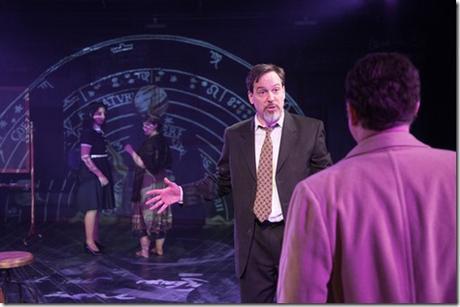
Shawn Douglass (Galileo Galilei), Kelsey Brennan (Andrea Sarti), Henry Bolzon (Vanni, Chamberlain, Cardinal), Stephanie Diaz (Mrs. Sarti), Susaan Jamshidi (Virginia), Todd Michael Kiech (Federozini, Bellarmin, u/s Galileo), Blake Montgomery (Priuli, Barberini), Caleb Probst (Ludovicio, Guard), Kevin Matthew Reyes (Fulgazino, Cosimo de Medici), Stephen Spencer (Sagredo, Grand Inquisitor)
behind the scenes
Nick Sandys (director), (translation), Beth Wolf (asst. director), Christa Van Baale (stage manager), Jacqueline Marschke (asst. stage manager), Alexandra Garfinkle (dramaturg), Joe Klug (set design), Rachel Lambert (costume design), (lighting design), Christopher Kriz (sound design), John Boesche (projections design), Christopher Neville (props design), Stephanie Diaz (puppet design), Johnny Knight (photos)
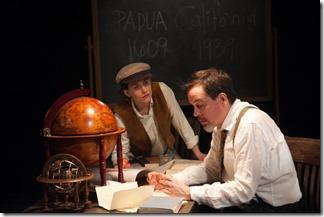
Tags: 16-0358, Alexandra Garfinkle, Bertolt Brecht, Beth Wolf, Blake Montgomery, Caleb Probst, Chicago Theater, Christa van Baale, Christopher Kriz, Christopher Neville, David Hare, Greenhouse Theater, Henry Bolzon, Jacqueline Marschke, Joe Klug, John Boesche, Johnny Knight, Keith Glab, Kelsey Brennan, Kevin Matthew Reyes, Mike Durst, Nick Sandys, post, Rachel Lambert, Remy Bumppo Theatre, Shawn Douglass, Stephanie Diaz, Stephen Spencer, Susaan Jamshidi, Todd Michael Kiech
Category: 2016 Reviews, Bertolt Brecht, Greenhouse Theater Center, Keith Glab, Remy Bumppo

